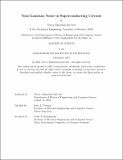Non-Gaussian Noise in Superconducting Circuits
Author(s)
McCourt, Trevor Johnathan
DownloadThesis PDF (9.196Mb)
Advisor
Chuang, Isaac L.
Terms of use
Metadata
Show full item recordAbstract
In stark contrast to man-made systems, living things embrace noise and use it to further their functionality. It is therefore not surprising that some lifeforms couple strongly to environmental fluctuations, and can leverage non-Gaussian noise to gain a competitive edge over their peers. In this thesis, I study non-Gaussian fluctuations using a system of Transmon qubits as ultra-sensitive quantum sensors and make the first clear experimental observation of non-Gaussian noise in a qubit system. I achieve this using multi-qubit dynamical decoupling sequences that characterize noise during two-qubit gates when the system is coupled strongly to flux fluctuations. This noise is qualitatively different from the well-studied noise that leads to single qubit dephasing; it simultaneously affects the two qubits, inducing fluctuations in their entangling parameter. In our superconducting system, the experimentally observed noise is consistent with random telegraph noise and leads to the stepwise decay of signals. With this clear characterization of non-Gaussian noise in hand, we have paved the way for a new class of lifelike engineered systems that harness noise to their benefit.
Date issued
2023-09Department
Massachusetts Institute of Technology. Department of Electrical Engineering and Computer SciencePublisher
Massachusetts Institute of Technology